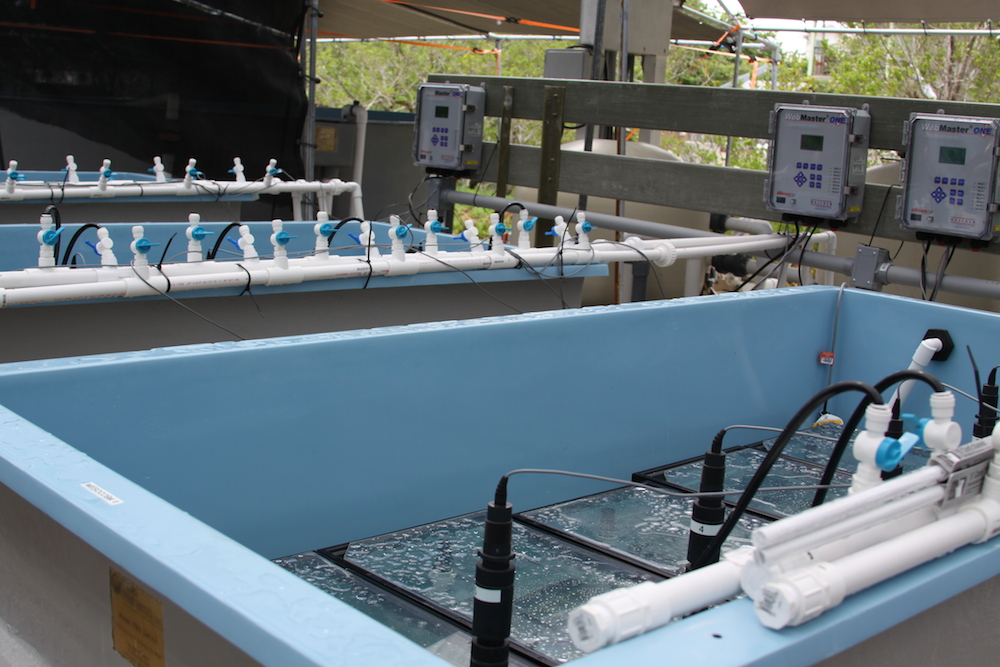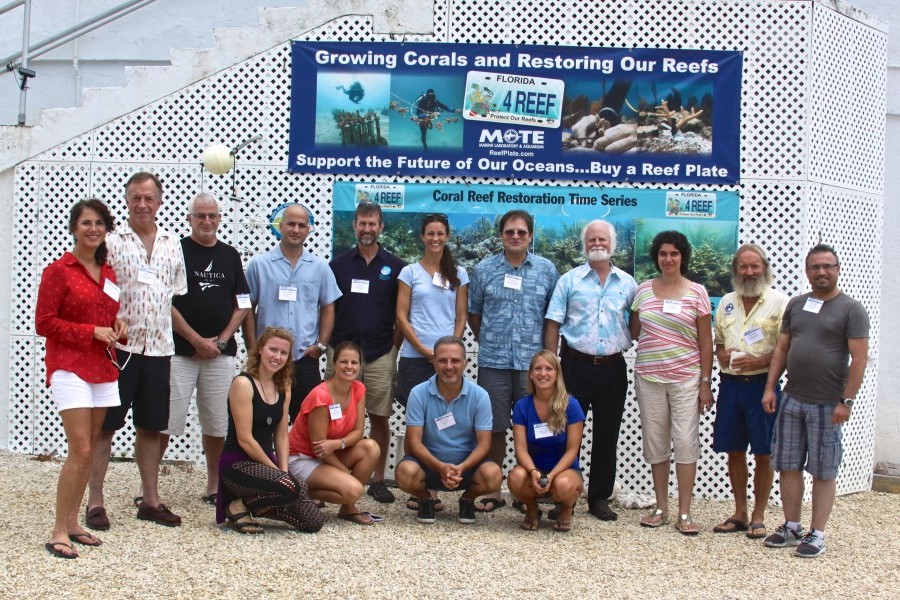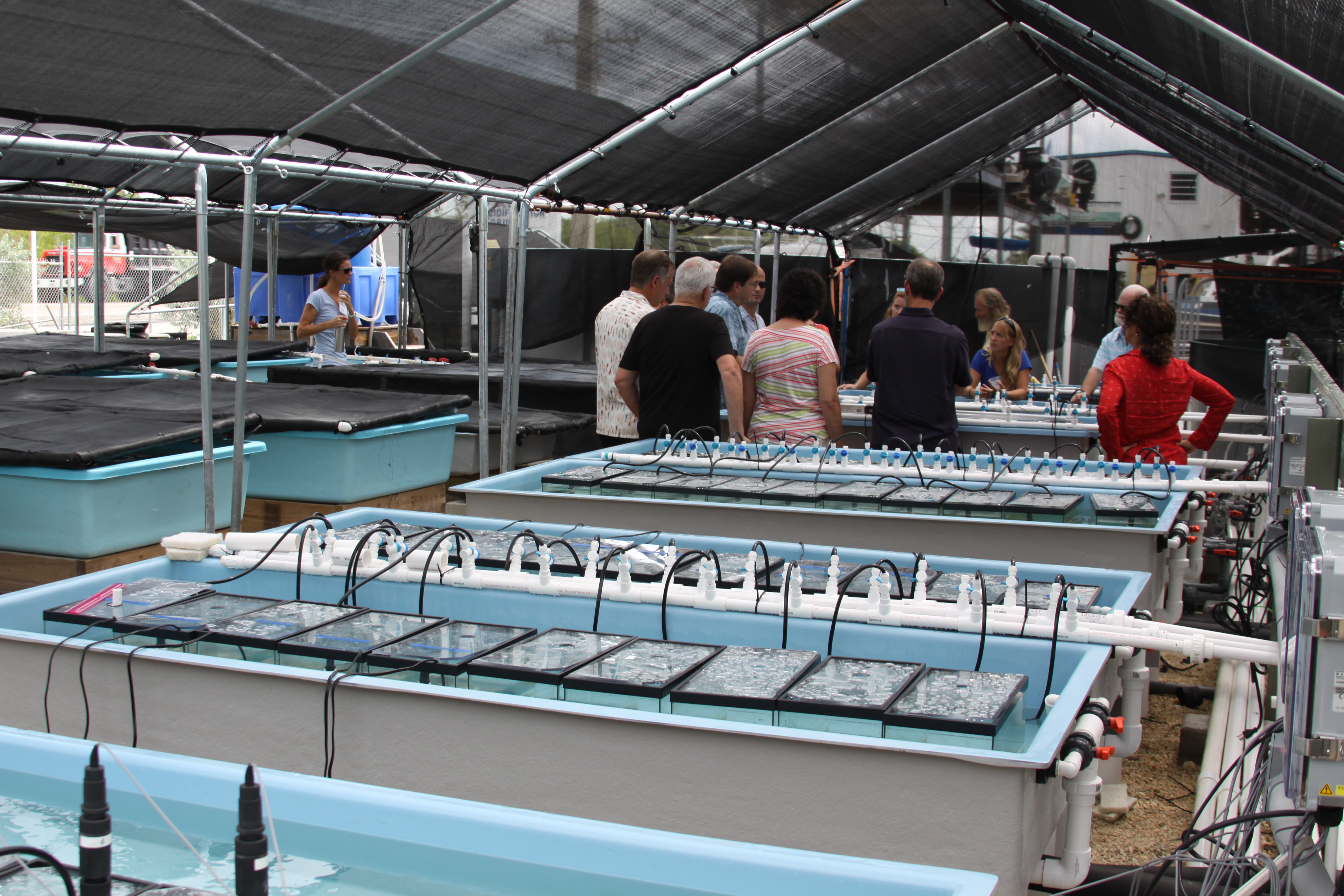Mote hosts 2nd International Workshop on Impacts of Ocean Acidification and Climate Change on Corals
Photo: Researchers from seven nations gather for the 2nd International Workshop on Impacts of Ocean Acidification and Climate Change on Corals and Coral Reefs, which was lead by Mote Marine Laboratory. The Workshop took place from Aug. 25 – Sept.1, 2015, at Mote’s Tropical Research Lab in Summerland Key, Fla. (Credit: Mote Marine Laboratory.)
The 2nd International Workshop on Impacts of Ocean Acidification and Climate Change on Coral Reefs was co-hosted by Mote Marine Laboratory and the Interuniversity Institute for Marine Sciences (IUI) of Eilat, Israel. The Workshop took place at Mote’s Tropical Research Lab in Summerland Key, Fla. from Aug. 25 – Sept.1, 2015 and brought together participants from Cuba, Israel, Jordan, Italy, Guam, the U.K. and the U.S.
The workshop allowed international scientists to collaborate in creating an ocean acidification experiment that is kicking off this month at Mote's Keys facility.
Ocean acidification (OA) is one of the greatest global threats to coral reef ecosystems. OA refers to the chemical reactions when carbon dioxide (CO2) is absorbed by seawater. This causes a water chemistry change often called the “osteoporosis of the sea” because it is expected to weaken and even dissolve calcium carbonate structures such as coral skeletons and mollusk shells, and it may affect a wide array of other marine animals and ecosystems.
Research has shown that corals under increasingly acidic ocean conditions are more susceptible to “bleaching.” Coral bleaching occurs when corals become stressed due to high-temperature water and the symbiotic algae they depend on for some of their food leave the corals' tissue. Without their symbiotic algae, corals appear white in color, and this bleaching can eventually lead to coral death. Ocean acidification can also lead the calcium carbonate skeletons of coral to dissolve, causing destruction of coral reefs themselves.
“Passion for marine science and our partnerships with other institutions around the world have been primary pillars for Mote Marine Laboratory over our 60 year history that enable Mote to have a global impact on conservation and sustainable use of our shared marine environment,” said Dr. Michael P. Crosby, President and CEO of Mote. “Mote and the Inter-University Institute for Marine Science in Eilat, Israel, were pleased to co-host their 2nd International Workshop on Ocean Acidification Impacts to Coral Reefs, which fostered collaborative efforts among a diverse, international group of scientific experts to study Florida Keys coral reefs' resilience to ocean acidification and the potential for successful restoration of corals under declining ocean pH levels that can be applied to other ecosystems around the world.”
Dr. Emily Hall, Mote Staff Scientist and Manager of the Ocean Acidification Program, shared the same enthusiasm for the workshop.
“Ocean acidification is a real, global issue that is happening right now and there are many reasons for concern," Hall said. “We depend on our marine ecosystems for food, economy, medicine, tourism, art and quality of life. The impacts of ocean acidification are potentially detrimental to some of these things and the need for a solution to this problem is greater now than ever.”
The OA Program started at Mote with a small indoor OA system located at Mote's Summerland Key facility. From there, the Program added an outdoor system in the Summerland Key facility and an indoor system in Mote’s main Lab in Sarasota. After three OA workshops that Mote held in Sarasota (2012-2013) and one OA workshop in Israel with Dr. Maoz Fine at the IUI (2013), Mote scientists applied for a National Science Foundation (NSF) facilities grant to build upon the system in the Keys. Mote was awarded the NSF facilities grant for 2014/2015 and is currently making finishing touches on the system.

Mote's new Keys-based ocean acidification system, OAFTERU (Ocean Acidification Flow-Thru Experimental Units), which workshop participants will use for future mesocosm studies involving coral reef organisms from the Florida Keys to study how ocean acidification and climate change will affect the local ecosystems. (Credit Mote Marine Laboratory.)
“The impact of OA on coral reefs is significant and this workshop presents a good opportunity to learn more about these pressing issues. This partnership with Mote is important, because what is happening in the coral reefs here is associated with what is happening with coral reefs in Cuba. In Cuba, we don’t have the right resources to conduct this type of research. We can exchange knowledge and resources here at the workshop to make a difference,” said Pedro Alcolado Prieto Marine Biologist at Instituto de Oceanologia in Cuba.
“Ocean acidification is the hottest topic for coral reef researchers, because it is a major environmental concern. It is my goal to learn as much as possible during this workshop and work in collaboration with Mote Marine Laboratory, which is such a beautiful and incredible research facility, and others to make progress on this hot topic,” said Dr. Yehuda Benayhu, Professor at Tel Aviv University, Israel.
Workshop participants gather around the OA system mesocosm tanks to discuss possible mesocosm study ideas. (Credit Mote Marine Laboratory.)
During the workshop, participants planned lab and field experiments with coral reef organisms from the Florida Keys to study how ocean acidification and climate change will affect the local ecosystems. Participants emphasized multi-year, reef community-based experiments geared toward providing research to better inform managers and policy makers. A mesocosm experiment, which hopes to provide reef community-based information under ocean acidification and climate change, will begin this month, and is based off of participant’s ideas and contributions. All participants will continue to contribute to the science of these mesocosm studies as they run for the next 12 months.
"It is incredibly important to start to design mesocosm experiments that answer questions about the impacts of ocean acidification on corals. I am most interested in determining how microbes interact with the coral host and even with other microbes. The beauty of these kinds of experiments is that they allow each of us to provide a missing piece of the puzzle,” said Dr. Kim Ritchie, Mote Senior Scientist and Manager of the Marine Microbiology Program.
A mesocosm is an experimental tool that brings a small part of the natural environment under controlled conditions. In this case, the group designed a mesocosm experiment utilizing Mote’s new Ocean Acidification Flow-Thru Experimental Raceway Units (OAFTERU) and corals from Mote’s nursery. The Ocean Acidification Program is fairly new at Mote, established in 2012 to research and understand responses of ecologically important species — like corals — to projected levels of ocean acidification.
The schedule for the weeklong workshop was full. After initial group discussions and breakout sessions, all participants left the classroom for some hands-on learning. Participants dove or snorkeled in Looe Key, as well as at Mote’s coral nursery nearby, to ensure everyone could experience a Florida Keys reef, and gain perspective. Since coral restoration under ocean acidification was also a topic of the meeting, participants saw the nursery where staghorn coral (Acropora cervicornis) are propagated and raised for reef restoration. This also gave participants perspective and offered inspiration for creative thought and insight for discussions.
“This workshop is a unique opportunity that brings many members from all over the world to collaborate together to find solutions to a problem that affects us all, ocean acidification and climate change,” said Dr. Ali Al-Sawalmih, Research Assistant Professor at the University of Jordan. “This workshop brings people from all different nationalities together, enhancing future collaborations, which is important for the future of the environment.”
The researchers at the workshop also compiled published information to create a manuscript focusing on regional differences in ocean acidification rates of change, and identify areas of possible refugia, an area where special environmental circumstances have enabled a threatened species to survive, and determine how reef processes may be impacted by ocean acidification because of these regional differences.
“Ocean Acidification is a global problem,” said Dr. David Vaughan, Executive Director of Mote’s Tropical Research Lab in Summerland Key. “It was very important to have and international group of people to discuss multi-regional impacts and what we can do in these different areas. It brought people together from all over the world with different expertise, which will enable us to collaborate and work together on this global issue.”
Participants from the organizations leading the recent workshop included:
Mote:
- Dr. Michael P. Crosby, President and CEO
- Dr. Erinn Muller, Staff Scientist and Manager of the Coral Health and Disease Program
- Dr. Kim Ritchie, Senior Scientist and Manager of the Marine Microbiology Program
- Dr. Emily Hall, Staff Scientist and Manager of the Ocean Acidification Program
- Dr. Dave Vaughan, Executive Director of Mote’s Tropical Research Laboratory
Tel Aviv University, Israel
- Dr. Yehuda Benayhu, Professor, Department of Zoology
Instituto de Oceanologia, Cuba
- Pedro Alcolado Prieto, Marine Biologist
Universita degli studi de Palermo, Sicily
- Dr. Marco Milazzo, Lecturer in marine ecology
Marine Science Station, Jordan
- Dr. Ali Al-Sawalmih, Research Assistant Professor
University of Guam
- Dr. Terry Donaldson, Marine Lab Director and Professor
Plymouth University, Great Britain
- Dr. Jason Hall-Spencer, Professor of Marine Biology
NOAA, College Park, MD
- Dr. Mark Eakin, Coordinator, NOAA Coral Reef Watch
University of New Hampshire, Durham, NH
- Dr. Michael Lesser, Research Professor
- Dr. Kathy Morrow, Postdoctoral Researcher
University of Mississippi, Oxford, MS
- Tammy Goulet, Professor, Department of Biology
Environmental Protection Agency
- Cheryl Hankins, Biologist
About the Mote-Israel Partnership
The 1st International Workshop on Impacts of Ocean Acidification and Climate Change on Corals and Coral Reefs was co-hosted by Mote and the Interuniversity Institute for Marine Sciences (IUI) of Eilat, Israel and took place in Eilat.
Mote has a long history of research in Israel and collaborations with scientists there. Mote’s Founding Director, famous “Shark Lady” Dr. Eugenie Clark, conducted some of her early fish and shark research in the 1950s with colleagues in the Red Sea.
In 2014, Mote and the IUI in Eilat, Israel signed a memorandum of understanding (MOU) that has led to new research endeavors designed to understand the impacts that climate change and ocean acidification will have on coral reefs and find ways to restore and protect reefs worldwide. The MOU builds upon the Mote-Israel Cooperative Marine Research Program, which supports research initiatives benefitting the environments of both nations.
Mote’s President and CEO, Dr. Michael P. Crosby, has worked closely with top Israeli researchers since 1994. Crosby is also a former chairman of the United States-Israel Binational Science Foundation Board of Governors and has served on the Board since he was appointed by the U.S. State Department in 2002.
About the Mote-Cuba Partnership
Beginning in the last century, Mote scientists have built relationships with the National Aquarium of Cuba and a diversity of marine researchers in other Cuban institutions, which have formed the foundation of the U.S.-Cuba-Mexico Trinational Initiative for Marine Science and Conservation in the Gulf of Mexico and Western Caribbean. This partnership conducts joint research and monitoring of key species and threats to the Gulf of Mexico’s and Western Caribbean's biodiversity and critical habitats.
Cuban marine scientists and students work closely with Mote coral researchers through workshops that bring Cuban coral reef scientists to Mote’s field and main labs in Florida. Mote. Scientists from Mote’s Shark Biology & Conservation Program have worked with scientists from the National Aquarium of Cuba, University of Havana and other Cuban organizations for more than 10 years to address key questions about shark behaviors in Cuba.
About the Mote-Jordan Partnership
Mote Marine Laboratory and The University of Jordan (UJ) in Aqaba, Jordan signed a memorandum of understanding (MOU) in 2011 to establish and broaden exchanges and scientific cooperation in the field of marine sciences, particularly as it pertains to promotion of sustainable use of marine and costal resources in the Gulf of Aqaba, the Gulf of Mexico and the Florida Keys. Areas of significant interest to both Mote and the UJ include ecology of fishes, corals and other marine invertebrates.
A major focus of UJ is to expand the capabilities of the Marine Science Station and enhance the growing research and education programs of the faculty of the marine sciences that address critical needs of Jordan’s only marine ecosystems.
Mote’s President and CEO, Dr. Michael P. Crosby, has led U.S., Israeli and Jordanian partners in the Red Sea Marine Peace Park Cooperative Research, Monitoring and Management Program — an effort to protect coral reefs that support thousands of species in the Gulf of Aqaba.

